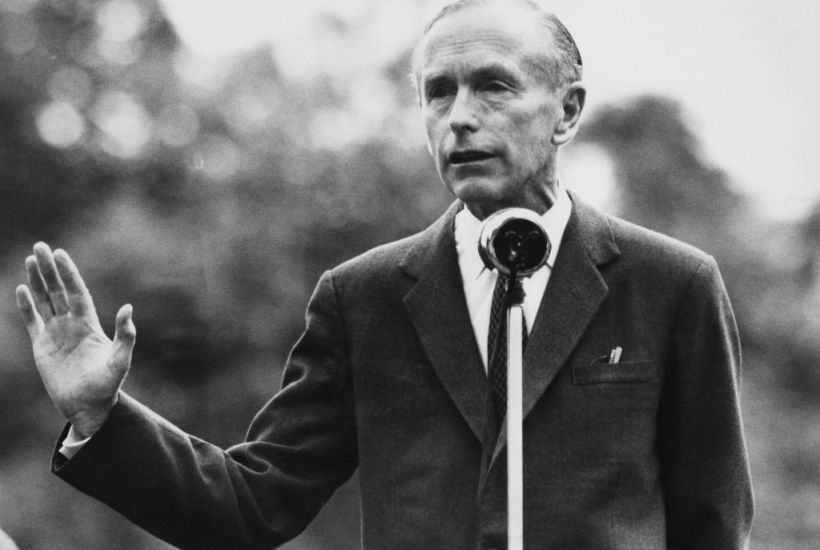It’s often been said that the late Queen Elizabeth II rarely if ever put a foot wrong during her 70-year reign. Trained from a young age to betray no sign of partiality, or even of individuality, she lived long enough to become the matriarchal figure at the centre of everyone’s favorite soap opera. In a world of change, she never wavered. Her death last year may have drawn a final line under the era we knew as ‘postwar’, where qualities like stoicism and self-effacement still just about prevailed in British life, and where nobody blamed, whined or emoted.
But as the curious events of exactly 60 years ago prove, the Queen, like most of us, was also capable of the occasional faux pas.
The story began on the morning of 8 October 1963, when the famously unflappable Harold Macmillan, Britain’s Conservative prime minister since January 1957, politely excused himself during the course of a cabinet meeting, admitting he felt a ‘trifle indisposed’. The 69-year-old Macmillan, who was actually in excruciating pain, was found to be suffering from the not-uncommon condition of an enlarged prostate. It wasn’t immediately known if cancer was involved.
The Queen, like most of us, was also capable of the occasional faux pas
Although Macmillan’s illness came out of the blue, his political decline was by then well advanced. To many observers, he seemed to have become an increasingly anachronistic figure in a Britain where ‘classlessness’ was now all the rage, and the Beatles were seen gleefully shaking their pudding-bowl haircuts nightly on television. In particular, the lingering aftermath of the Profumo Affair had squared the circle of foolish trust and moral incontinence that appeared to hang over the government. Painfully aware that ‘political authority is like that of the lion-tamer — once undermined it can never be quite restored’, Macmillan accepted that it was now the end of his career. His illness had ‘come as manna from heaven… almost an act of God’, he told one of his doctors.
Macmillan’s surgery took place in London on 10 October, just as his colleagues were meeting 250 miles away in the seaside resort of Blackpool for an annual party conference that became a hurriedly improvised contest among the leading candidates to replace him. The main contenders were the superbly languid ‘Rab’ Butler, Macmillan’s long-serving deputy; the brilliant but volatile Quintin Hogg, more formally known as Viscount Hailsham, fresh from having led the British delegation at the successful nuclear test ban talks in Moscow; and chancellor of the exchequer Reginald Maudling, a genial alcoholic, at forty-six representing youth.
Three days later, Maudling had been ruled out after delivering a curiously disjointed speech to the party faithful, Hailsham was excluded by virtue of campaigning for himself in a manner widely thought vulgar, or in the Times’s view, ‘indulging in those excesses more worthy of an American convention’ (among them, bottle-feeding his infant daughter in front of the television cameras), and Butler, the heir-apparent, self-destructed by going to the opposite extreme and seeming not to care one way or another.
Out of the vacuum there emerged the diffident, blinking figure of the 14th Earl Home (soon to be plain Sir Alec Douglas-Home), the foreign minister, who was then aged 60 but looked at least ten years older. Lying in bed in a post-operative fog, still in pain and woozy from drugs, Macmillan seems to have been swayed by the reports reaching him of ‘rather undignified behaviour’ among certain members of a party that prided itself on tradition and restraint, and also by his fears that if the irascible Hailsham were made prime minister ‘this could spell trouble’ for Britain’s foreign relations. Soundings taken among the cabinet further revealed that some ministers disliked Butler intensely, while others would have emigrated to Australia rather than serve under Maudling. Alec Home may have had scarcely any active supporters, but he also had few real enemies.
On the morning of 18 October, the Queen took the unprecedented step of coming to her prime minister’s hospital bed in order to accept his resignation. Macmillan received her wearing his pajama bottoms and a white silk shirt, which he partly covered with a well-darned, brown V-necked sweater. He later noted the incongruity of the scene in an interview, calling it ‘extraordinary… the bed covers were down, and concealed underneath the bed was a pail with a tube full of bile coming out of me… I made my resignation to my monarch for an hour, in great discomfort.’
At the end of this, the Queen asked if perhaps Macmillan had any advice as to whom she should appoint as his successor, and Macmillan said that in his opinion ‘Lord Home [was] the best choice to gain general support’. After that, ‘she thanked me, agreeing that Alec was the one, and then we chatted some more and she left’. Whatever Home’s other merits, it has to be said that his unexpected promotion to the top job was not noticeably a step in the direction of modernizing Britain. Perhaps it was simply his misfortune in the television age to resemble a prematurely hatched bird, whose Adam’s apple danced up and down his narrow neck. Twenty minutes after the Queen left, a man wearing brown overalls then appeared in the outgoing prime minister’s hospital room and unceremoniously removed his special ‘scrambler’ link to the White House. ‘I knew that was the end’, Macmillan said.
Home’s appointment caused something of a political storm, not least among the cabinet itself. Enoch Powell, the ever-contrarian health minister, accused Macmillan of ‘gross impropriety’ in having ‘deprived the Queen of the exercise of her principal prerogative’. The outgoing party chairman Iain Macleod was on turf well beyond this when he went on to publish a blistering article in The Spectator accusing Macmillan and a ‘magic circle’ of Tory grandees, almost all of them Eton-educated, of having forced the Queen to accept Home’s appointment as a fait accompli.
Had the monarch herself erred, others wondered, by going to the hospital in the full glare of the media, knowing that Macmillan was planning to resign, rather than simply exchanging notes in which she could have invited him to stay on in a caretaker role pending further consultations? Macleod was far from alone in thinking it had all been an establishment stitch-up. As even the Queen’s private secretary Michael Adeane later recalled: ‘When she got the advice to call Alec she thought “Thank God”. She loved Alec – he was an old friend. They talked about dogs and shooting together.’
The whole saga threw light on some of the murkier corners of the British constitution, which of course relies not a written set of rules, but precedent – which in 1963 still meant whatever the ruling elite felt it could reasonably get away with. By the time Home in turn came to resign the Conservative leadership in July 1965, the party had adopted the quasi-democratic consultation process that continues to operate on a roughly biennial basis today.
Macmillan sometimes sardonically referred to the remaining time left to him following resignation as his ‘life after death’. Once predicted to be a matter of months, or at best a few years, it lasted for nearly a quarter of a century. He died only in December 1986, aged 92. Certain friends said that he later regretted not only leaving office when he did, but also the manner in which he did so.
Got something to add? Join the discussion and comment below.
Get 10 issues for just $10
Subscribe to The Spectator Australia today for the next 10 magazine issues, plus full online access, for just $10.




















Comments
Don't miss out
Join the conversation with other Spectator Australia readers. Subscribe to leave a comment.
SUBSCRIBEAlready a subscriber? Log in